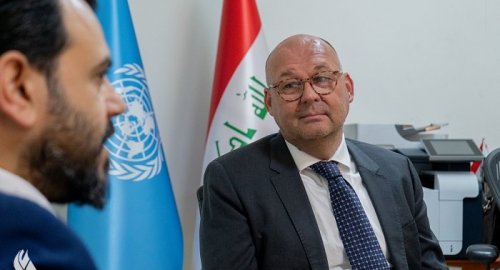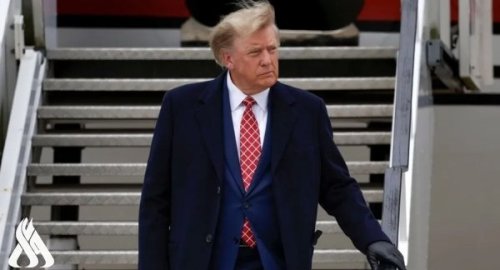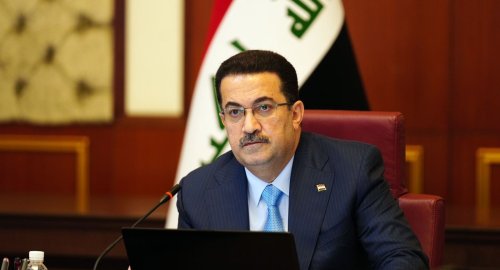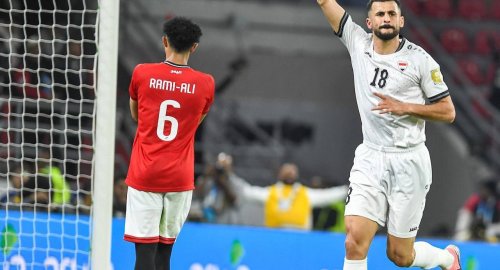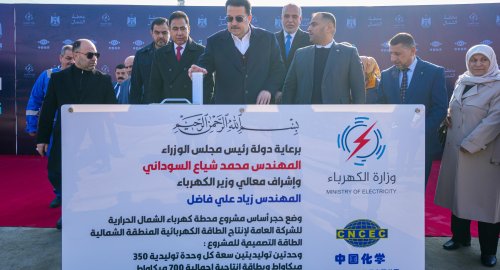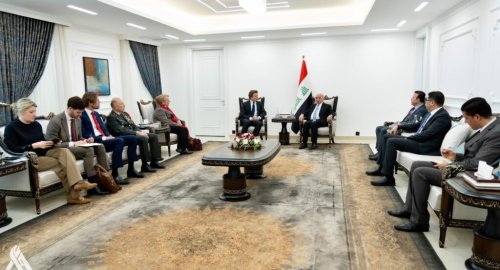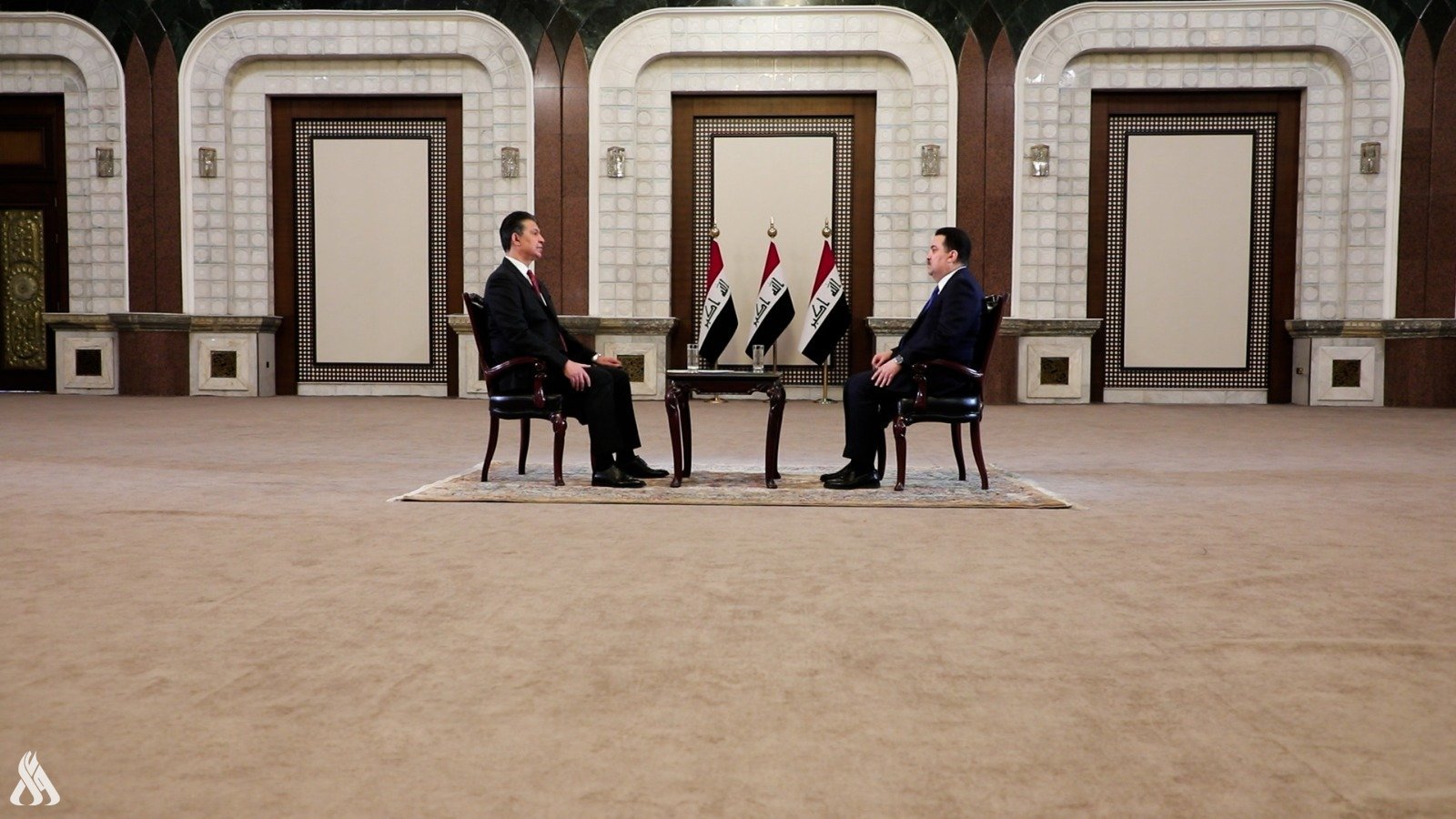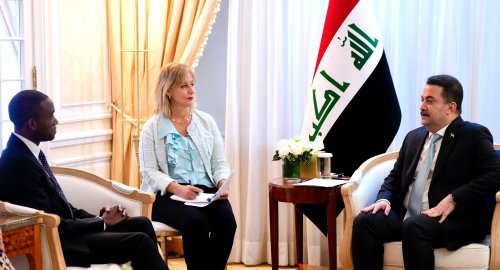
Due to US support, Iraq's non-oil GDP grows twice as fast as the population

- 26-09-2024, 16:59
Baghdad - INA
In clear and tangible steps, the Iraqi government has begun implementing economic reforms by diversifying sources of income and reducing dependence on oil. Recent economic data showed an annual growth of 6% in non-oil GDP, highlighting the efforts made in the fields of industry, agriculture and the digital economy, which led to the creation of a suitable investment environment.
On the sidelines of the UN General Assembly meetings, the recent meeting between Prime Minister Mohammed Shia al-Sudani and US Deputy Treasury Secretary Wally Adeyemo reflects Iraq’s commitment to strengthening its banking system and improving financial transparency.
The financial advisor to the Prime Minister, Mudhar Muhammad Salih, told the Iraqi News Agency (INA): "The economic growth of the non-oil GDP, which reached 6% annually, is a positive indicator of the development of economic welfare, as it exceeds twice the population growth rate."
He pointed out "the importance of economic diversification, especially in the fields of the digital economy and the communications sector, and the role of the investment renaissance in infrastructure, in addition to the successes in the agricultural sector, which achieved self-sufficiency in grain production, citing the government's decisions to support the manufacturing industry."
He explained that "launching sovereign guarantees for the private industrial sector to provide external financing directly linked to providing production lines in modern technologies from specific countries in the world will undoubtedly cover the technological renaissance in five groups of important value-added manufacturing industries that are undertaken by the private industrial sector with high leadership and state support."
He added, "At the forefront of the industrial policy are the products which are linked to the country's physical infrastructure and the general social capital such as roads, bridges, housing, etc., in addition to the pharmaceutical industry, petrochemical industries and their products linked to agricultural activity, in addition to the crude oil refining industries and achieving self-sufficiency in petroleum derivatives."
He pointed out that "the country will be self-sufficient in the national production of many derivatives, including gasoline, within the next twenty months, in addition to zeroing out the burning of associated gas and converting it into products linked as clean fuel in power generation stations, in addition to other industrial uses."
He added, "The joint renaissance in construction, housing, industries, digital services, communications, transportation, distribution and agriculture sectors all represented a driving economic force crowned by material and human investments that indicated the high growth in non-oil national income."
He pointed out that "the manifestations of this economic driving force took two basic directions in the economic life of Iraq, the first: the combination of the economic investment and production vision between the state and the private sector in maximizing the national product, and the other is the birth of a production and investment climate led by the construction and digital services sectors, within the options of sustainable economic development and its priorities, which were considered at the forefront of the factors that led to the increase in growth rates in the gross domestic product outside the oil sector."
He added, "The strategy contributed to driving the wheel of growth in the manufacturing industries supported by easy government policies, which led to confronting unemployment and maximizing economic growth," indicating that "the sectoral renaissance, following the priorities of the government program, required, first, the implementation of important institutional reforms in the main economic sectors, starting with reforming the financial sector (tax, customs, and banking) and introducing them into digital life and strengthening governance in them to raise their production efficiency and maximize levels of efficient work and financial resources."
He added, "Reforming the public finance sector and banking financing are two matters that accompany Iraq's strategic vision for the next ten years (the path of development), in which the country will move to a new renaissance in a proactive manner that will be crowned by the birth of the economic and industrial cities movements and by a national, regional and international partnership that will make the Iraqi economy make its way strongly."
While the financial and economic expert, Qusay Safwan Abdul Halim, believes that “Al-Sudani’s government is serious about the issue of economic diversification by increasing the ability of Iraqi banks to enter into strategic projects,” noting that “there are no less than 20 billion dollars that are supposed to be financed for related development projects.”
He pointed out, in a statement to (INA), that "Iraqi banks have the opportunity to enter to finance the project to link the port of Faw to the European Union, according to joint arrangements with international companies and also according to guarantees that the federal government can provide because it has placed such guarantees in the three-year budget."
He explained that "the Prime Minister is interested in Iraq's entry into the World Trade Organization to protect investors who are looking to meet local demand by increasing production volume, and thus certainly opening up to the Gulf countries will contribute to attracting this money, as well as linking China's economic power with the European Union's economic power by completing the Faw Port and the development road, which is a gateway to strategic economic diversification, especially since Iraq has resources in all sectors that can be invested, starting with the geographical location and ending with resources represented by cement, phosphate, silica and sulfur, in addition to tourist sites, as Iraq has no less than 12,000 tourist sites that could be an attractive investment opportunity."
He explained that "the government has shown its priorities in the issue of stopping gas flaring and building on gas industries in terms of petrochemicals, cosmetics and other industries that could give value to Iraqi oil, as well as the issue of stopping the import of petroleum derivatives and entering the world of exporting these derivatives, as all of these are promising projects that could contribute to increasing the ability of the Iraqi economy to diversify."
Meanwhile, Mustafa Hantoush, a researcher and specialist in the financial and banking aspect, confirmed that “the most prominent meeting from an economic perspective is the meeting of the Prime Minister with the US Deputy Secretary of the Treasury (Wally Adimo), as this meeting represents the great interest of the Prime Minister in the state of the economy, especially the Iraqi banking system, which represents the basis of economic stability in the country.”
In a statement to (INA), he pointed out "the procedures that preceded this meeting, including the Prime Minister's support for the Iraqi banking sector and the directives on the necessity of creating a state of competition and non-monopoly in the banking system, in addition to the agreement of the Central Bank of Iraq less than a month ago in the New York talks to contract with the company (Oliver Wyman) to review and audit the status of the Iraqi banks restricted from the dollar, amounting to (28) banks, and awaiting the signing of the contract with them and the start of work."
He added, "The Prime Minister's meeting on this file and other files represents a development in the Iraqi-American financial and banking relations and gives positive indications to the Iraqi market regarding important files such as the dollar, the Iraqi banking system, and other files."
In turn, the economic and financial expert, Abdul Rahman Al-Shaikhli, stated that “the US Deputy Secretary of the Treasury’s praise of Iraq’s progress and commitment to international standards to achieve exemplary banking reform is a fact that no one can deny.”
He added in an interview with (INA), "There is growth in the sectors that fund the state budget from other than oil revenues, especially since Iraq announced that it will be satisfied with importing many oil products after Iraqi refineries produce those products, and it will also achieve more resources while it was able to control the financial corruption that drains its resources, especially since Iraq is on the threshold of the path of sustainable development and in the right direction for the first time since 2003."
In this regard, a government source revealed that "the discussions that took place between Prime Minister Mohammed Shia al-Sudani and US Deputy Secretary of the Treasury Wali Ademo on the sidelines of the UN General Assembly meetings two days ago, and the resulting statements and declarations, clearly reflect the Iraqi government's ongoing efforts in the field of financial and banking reform, as it is a vital and central goal within the program that the government has sought to implement during the past two years."
He added in a statement to (INA), "The Iraqi government had previously contracted with the international company Ernst & Young to restructure some government banks, including Rafidain and Rashid Banks, and work on this task began several months ago, while the Central Bank contracted with the international company Oliver Wyman to develop the private banking sector, as the implementation of the contract will begin in the coming period."
Regarding the remaining points discussed in the meeting, such as strengthening financial relations with the United States and efforts to combat money laundering and terrorist financing, the source confirmed that “Iraq regularly communicates with countries and international financial organizations to implement compliance standards and systems to combat money laundering and terrorist financing, and it continues its efforts in this field through its continuous cooperation and coordination with both MENAFATF and FATF organizations concerned with combating money laundering and terrorist financing, in addition to Iraq’s conclusion of agreements and memoranda of understanding with other countries to implement the latest standards in this field.”
He pointed out the importance of some points mentioned in the US Treasury Department statement following the meeting, including in particular:
1- The commitment shown by the US Treasury Department to support the Central Bank of Iraq as well as the reform plans sought by the Prime Minister in the financial and banking field.
2- The US Treasury statement focused on the 6.0 percent growth in Iraq’s non-oil economy, in light of the efforts made by the Iraqi government to diversify the economy and not rely exclusively on the oil sector.
The source stated that "the US Treasury statement reflects the positive view adopted by international bodies, banks, investors, and economic experts regarding the efforts made by the Iraqi government and the Prime Minister in the economic field in general and the financial and banking field in particular."
It is noteworthy that Prime Minister Mohammed Shia Al-Sudani met with US Deputy Secretary of the Treasury Wally Adeyemo on the sidelines of the United Nations General Assembly to discuss reforming the Iraqi banking sector, financial relations with the United States, and combating illicit financing.
Ademo congratulated the Sudanese Prime Minister on the significant progress made by Iraq in reforming the banking sector, which has expanded Iraq's international financial connectivity and increased financial inclusion, praising the growth of Iraq's non-oil economy by 6.0 percent.
Trump: I will stop the chaos in the Middle East and the war in Ukraine
- International
- 10:07
US Central Command: We killed ISIS terrorist leader Abu Yusuf in Syria
- International
- 24/12/20
Liverpool compete with Real Madrid to sign Olympique Lyonnais star
- Security
- 24/12/19
ISC, ADX discuss Strengthening Economic Ties
- Economy
- 24/12/16
Iraq assumes presidency of Arab Investment Company’s Executive Board
- Economy
- 24/12/17
